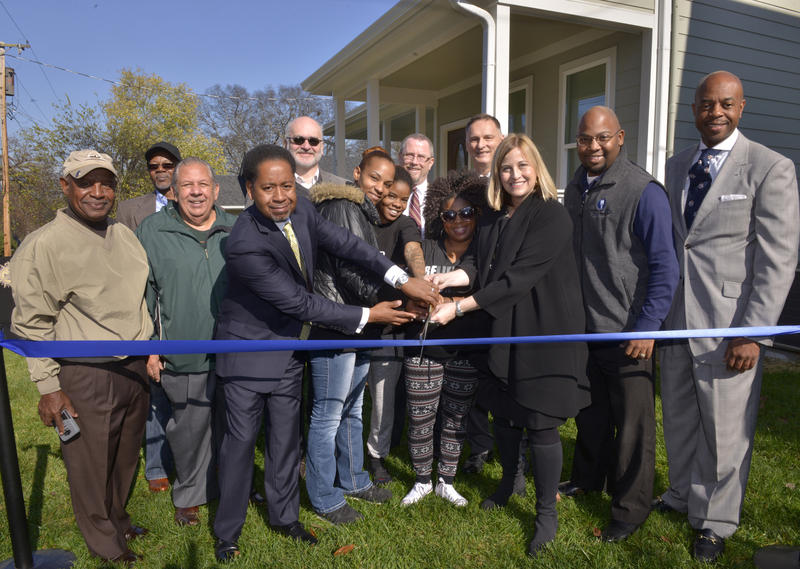
Nashville’s latest effort to create affordable housing will give about $2 million in grants to four non-profit housing development groups.
Those agencies will build units for a wide range of Nashvillians, from extremely low-income to the working class. Yet just as the city puts its housing fund to wider use, future federal aid — which plays a major role — is in doubt.
The new grants will go toward building 57 affordable units, mostly on
government-owned parcels in North Nashville. Some will be sold below market rate. Others will be rented out with a cap of $325 per month.
This latest batch of money is the second the city has provided since it started the
Barnes Housing Trust Fund in 2013.
The fund helps non-profits meet what experts call an affordability “crisis.”
“Somebody said to me, ‘If I gave you $150 million, what would you do?’ And I said: ‘Spend it.’ That’s how much affordable housing I could do if I had the money. There is such a need for money in the Barnes Fund,” said Cathie Dodd, executive director of the Woodbine Community Development Organization.
Her agency was funded in the most recent round to build 42 of the 57 units. Woodbine specifically serves very low-income seniors and people with disabilities.
Only three other agencies are slated to get money, out of 11 who applied, pending a final vote by
the board of the Barnes Fund. That’s the most competitive process the city has seen so far. Other approved recipients are New Level Community Development Corporation (5 units), Habitat For Humanity (8 units), and Affordable Housing Resources (2 units).

Dodd said evaluators did a good job of boosting organizations that help a wide array of income levels, from the lowest, which her group addresses, up to “workforce housing,” which includes units that rent for slightly above the area median income.
But while the fund is a step in the right direction, Dodd and Tony Woodham, a director at Woodbine, said vast needs are still going unmet.
“Things are worse. And the fact that we’ve become, the word they use — it’s not my word — is ‘It City.’ They use this ‘It City’ thing and you’re driving home prices up,” Dodd said. “Right now, [non-profits] are fighting builders for every inch of property, and they can pay more than I can. So I think it’s getting worse.”
“The private development community is not really meeting the needs of affordability in Nashville,” Woodham said. “Fortunately for us all, we have a non-profit community with the capacity to do that. It just requires some sort of subsidy.”
Shared-Living Homes Cut Costs
Woodbine Community Development has built affordable housing for 26 years, including homes for first-time buyers and apartments with capped rents. It also leads financial education and credit cleanup classes and provides tutoring for families who live in its homes.
Through the Barnes Fund, Woodbine has furthered a particular approach to affordable housing called “shared living.”
The agency now oversees 126 shared-living units across 23 homes. In each home, between three and seven senior citizens or persons with disabilities live together and share common spaces, like the kitchen. Rent is just $325 per month per person, including utilities. For many residents living on government subsidies, that’s a feasible payment, Dodd said.
“These shared-living centers allow you to use a portion of that — a third of income — to live and still have money for transportation, food and a safe roof over your head,” Dodd said.
Federal Funds Aren’t Guaranteed
For all of the recent attention on the Barnes Fund — especially from mayoral candidates — several housing advocates and officials
say it’s still dramatically underfunded.
While the latest $2 million in grants will bring the total awarded to about $5 million, the backbone of the fund has not been local money.
Only about a quarter comes from the Barnes Fund — $500,000 in this round.
The rest, $1.5 million, comes from the federal government in the form of HOME grants, distributed to the Metropolitan Development and Housing Agency, or MDHA
.
Combining the two sources helped create more affordable units, said Erik Cole, the
recently named director of Metro’s new Office of Economic Opportunity and Empowerment.
“It’s a good coordination,” Cole said, “because it builds the dollars.”
But MDHA leaders sounded the alarm this summer when Congress began considering a 93 percent cut to its HOME program.
Since 1992, Nashville has received $65.6 million from HOME grants. That money has “produced or preserved” more than 4,400 affordable units, according to MDHA.

In fact, as MDHA officials voted on the latest HOME grants Wednesday, one of the prior recipients — Be A Helping Hand Foundation — was cutting the ribbon on four new homes.
The organization used $262,000 from the Barnes Fund, $128,000 from MDHA’s HOME program and $405,000 from the Tennessee Housing Development Agency.
Those units are
among the first 75 that Metro has helped build since starting the Barnes Fund.
Meanwhile, as the federal funding is in doubt, Metro is trying to find new ways to get money into the Barnes Fund. For example, when the city chose a developer to renovate the old convention center downtown, officials required the firm to contribute $5 million to the fund. It also has earmarked tax revenues generated by Airbnb and other short-term rental properties.


